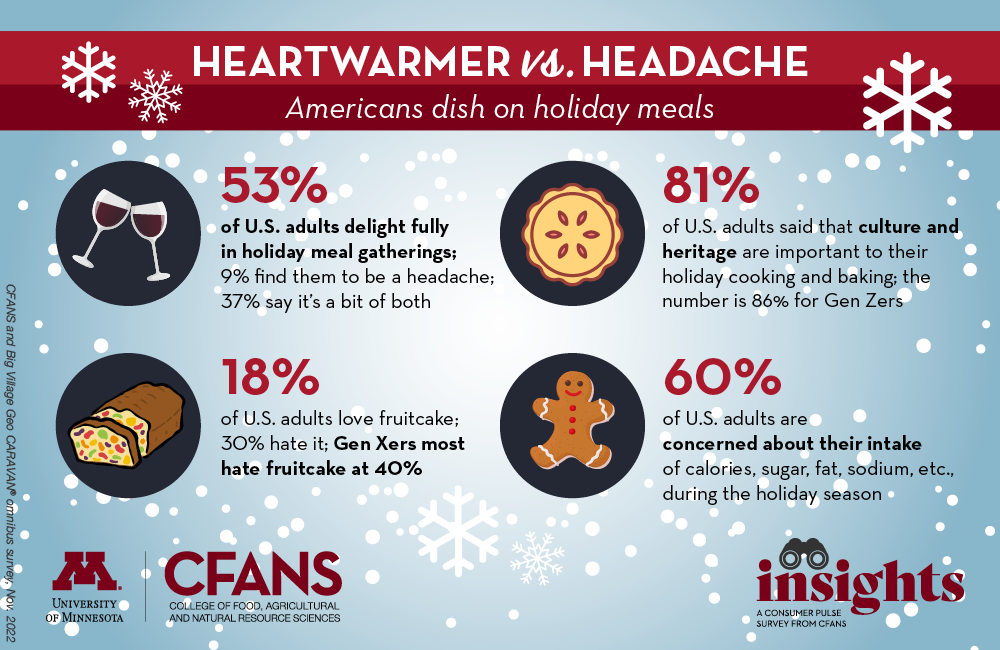
Heartwarmer vs. headache — Americans dish on holiday meals
CFANS Insights survey finds more than half of U.S. adults delight fully in holiday meal gatherings, and 81 percent cite culture and heritage as central to their celebratory cooking and baking
With a variety of multicultural holiday celebrations marking a festive time of year for many, December finds itself full of families, friends, and communities gathering to share meals. But do people actually enjoy these shared meal celebrations? A new CFANS Insights survey from the University of Minnesota’s College of Food, Agricultural and Natural Resource Sciences (CFANS) found that while 53 percent of U.S. adults find these events altogether heartwarming, almost a tenth associate them with hassle-induced headaches. Thirty-seven percent report a mix of both holiday meal elation and vexation. But whether people treasure these annual festivities thoroughly or not so much, it’s clear that customs are key when it comes to the food that’s prepared and shared.
Traditions around the table
Eighty-one percent of U.S. adults surveyed said that culture and heritage — like serving items that have been in their families for generations — are important to their holiday cooking and baking. While that number is significant across all generations, it is particularly high among Gen Zers, 86 percent of whom reported culture and heritage as important. In addition, 70 percent of Gen Zers indicated they’d be introducing new foods to holiday meals this year.
“Culture is at the top of the menu for many holiday meals,” said Job Ubbink, PhD, professor and head of the Department of Food Science and Nutrition at CFANS.
Ubbink teaches a course titled, “Food Customs and Culture,” which studies traditional and contemporary food cultures around the world. “Students really enjoy exploring how different cultures come together to create the rich and diverse food experiences we have in the U.S.,” he said.
Consumption considerations
Baby Boomers expressed the highest level of concern about intake of calories, sugar, fat, and sodium during the holiday season, at 65 percent, compared to 60 percent of the total adult population. At 62 percent, Gen Zers expressed higher levels of concern than Millennials or Gen Xers, both at 56 percent. All told, 41 percent of the general population was not concerned at all, saying “it’s once a year, I’m going to enjoy it!”
Joanne Slavin, PhD, RDN, and professor in the Department of Food Science and Nutrition, says we don’t have to categorize particular foods as decidedly “good” or “bad” for us. “Many traditional foods that are important in different cultural practices are put in the ‘unhealthy’ category, when in reality, no one food should be called unhealthy,” she said.
According to Slavin, we want to be sure that our overall diet contains all the nutrients we need and no more calories than we should be consuming based on our activity levels. “Packaged foods already contain critical information on calories and nutrients so consumers have access to food composition data that allows them to manage their diets as needed,” she said.

The annual fruitcake debate
Tracing its roots to ancient Rome to sustain troops in battle, fruitcake is ever the subject of argument. The CFANS Insights survey found that today, the holiday season staple is not poised to win any popularity contests. While 18 percent of adults love fruitcake, 30 percent profess a hatred for the dense delicacy.
Gen Xers express the most distaste, with 40 percent hating fruitcake. The group that most favors fruitcake is Millennials, albeit at only 23 percent. Adults in the Midwest (36 percent) dislike fruitcake more than any other region in the U.S. does, with those in the West declaring the most love, although at just 23 percent.
However you feel about fruitcake, there’s no question that customs and culture are important to our collective holiday meal gatherings — whether we’re feeling mostly warm and fuzzy, or just a bit frazzled and grumpy.
About the CFANS Insights Survey
The CFANS Insights survey is a consumer poll that explores key perceptions and opinions about important topics in food, agriculture, and natural resources. This survey was conducted in November 2022 by CARAVANⓇ omnibus surveys, polling a demographically representative sample of 1,006 U.S. adults.
About the College of Food, Agricultural and Natural Resource Sciences
The University of Minnesota’s College of Food, Agricultural and Natural Resource Sciences (CFANS) strives to inspire minds, nourish people, and sustainably enhance the natural environment. CFANS has a legacy of innovation, bringing discoveries to life through science and educating the next generation of leaders. Every day, students, faculty, and researchers use science to address the grand challenges of the world today and in the future. CFANS offers an unparalleled expanse of experiential learning opportunities for students and the community, with 12 academic departments, 10 research and outreach centers across the state, the Minnesota Landscape Arboretum, the Bell Museum of Natural History, and dozens of interdisciplinary centers.





